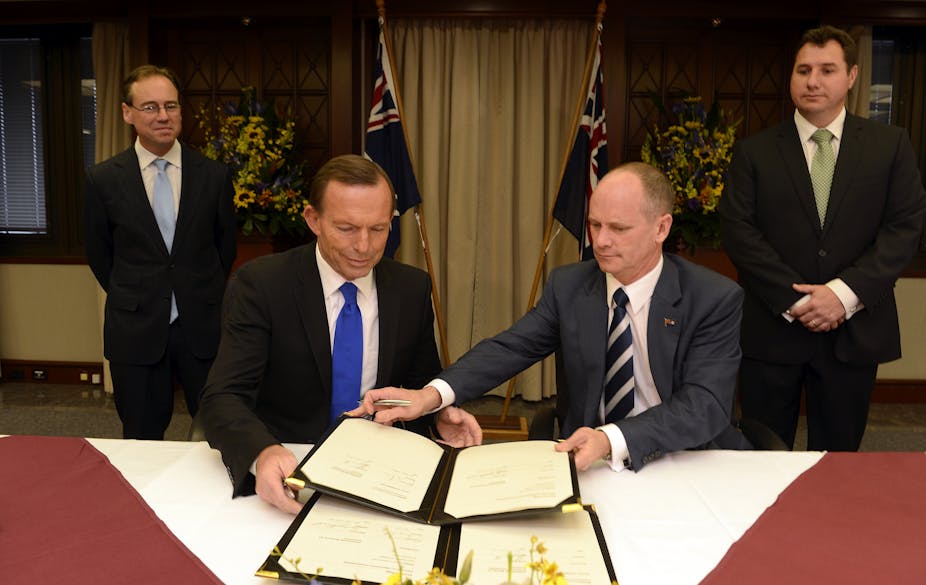Tony Abbott will face a fired-up “states’ union” at his first meeting with Australia’s premiers and chief ministers next month, with Queensland Premier Campbell Newman calling on the federal government to stop “meddling with the states”.
Mr Newman - who is about to take over as chairman of the Council for the Australian Federation, which aims to present a united front on behalf of all state and territories on national issues - said the election of the Abbott government meant there was “a window of opportunity” to save billions of dollars on overlapping state and federal bureaucracy.
The Queensland premier said he would be pushing at the upcoming Council of Australian Governments (COAG) meeting to decentralise power away from Canberra, as well as encouraging states to “get out of each other’s way” and hand back more power to local councils.
Mr Newman also took a “respectful” dig at his former home state of Tasmania, which is heavily subsidised by other states.
“I’m not saying this to be rude … Having grown up in northern Tasmania, I believe that Tasmania can do more, the leadership of Tasmania must do more, to generate economic opportunity. And indeed the people of Tasmania … seem to be against a lot of proposals for new economic development.”
The first COAG meeting under the Abbott government will be held in Canberra on December 13, and the prime minister has already signalled he wants to overhaul the way local, state and federal governments work together, which he has described in the past as “Australia’s biggest political problem”.
Earlier this month, an independent report found that too many major promises made at COAG meetings over the past five years had not been met, such as with queues for elective surgery growing.
Addressing a national forum of political and constitutional law experts at Queensland’s Parliament House yesterday, Mr Newman said COAG would remain a “dysfunctional farce” as long as the timing, agenda and running of the national meetings “are entirely at the discretion of the sitting Prime Minister”.
Mr Newman nominated biosecurity, drug markets and criminal gangs as national issues that should be discussed at COAG in future.
Former federal Labor MP and current chief executive of the Committee for Economic Development of Australia, Stephen Martin, broadly backed Mr Newman’s call for urgent federal-state reform.
Professor Martin said in his view, successive federal governments had proved to be excellent at raising revenue, but “useless at delivering services, perhaps with the exception of Centrelink”.
Experts respond
Associate Professor Anne Tiernan, from Griffith University’s School of Government and International Relations, said the Queensland premier’s concern about the federal domination of COAG at the expense of states, territories and local governments was an “absolutely fair criticism”.
“It’s utterly at the whim of the prime minister, and that’s hardly the basis for an effective intergovernmental forum,” Professor Tiernan said.
“If you remember, John Howard only held four meetings of COAG between 1996 and 2001 … I think COAG should meet at least twice a year, it should have a permanent secretariat involving state and territory officials as well as commonwealth officials, and it should focusing on an agreed set of national priorities.”
Curtin University politics professor Alan Fenna backed the idea of more regular COAG meetings to thrash out difficult national issues - though not too regular.
“When Kevin Rudd did it four times a year it was rather overwhelming for the states,” Professor Fenna said. “Four times a year might seem logical but I think it’s too much. Twice a year would probably be right.”
He also said that state and territory leaders could do more to reign in federal government power.
“The states have to show that they are capable of working collectively in solving this and in resisting the Commonwealth. What usually happens is that they resist Commonwealth intervention in state matters at first, but then one state break ranks and they all eventually concede.”
University of New South Wales professor of law Andrew Lynch said that if COAG was to work any better than under previous governments, all sides would need to compromise - starting from the top.
“The fact that COAG can be deferred and more importantly the agenda established by the PM means that we’ve seen COAG used in the past to really ambush the states. The Rudd health reforms were a great example of that: in the week’s leading up to the COAG meeting, to release further details of the policy and then say ‘now you’ve got to sign onto this’.
"If Mr Abbott’s serious about reinvigorating the federal relationship, then a really easy and quick way to make a start on that is the way in which COAG operates.”

